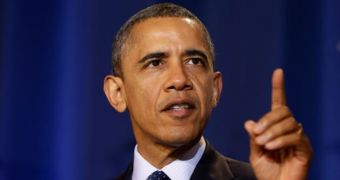US tech companies that have spoken out in favor of net neutrality and against FCC’s plans to allow ISPs to create so-called fast lanes are now praising Barack Obama for taking a stand and saying that his administration is against such measures.
“I personally, the position of my administration, as well as a lot of the companies here, is that you don’t want to start getting a differentiation in how accessible the Internet is to different users. You want to leave it open so the next Google and the next Facebook can succeed,” Obama said last week.
Mozilla, along with dozens of advocacy organizations and companies urged Obama not to stop at expressing his support for net neutrality, but to also take action to this end.
The group thanks Obama for making his support for net neutrality clear and puts a little pressure on the President by saying they’re counting on him to take action to ensure equality on the internet. They point out that a level playing field has been vital for innovation, opportunity and freedom of expression, which will also make possible for the next big thing to succeed.
“Like you, we believe in preserving an open Internet, where Internet service providers treat data equally, regardless of who is creating it and who is receiving it. Your vision of net neutrality is fundamentally incompatible with FCC’s plan, which would explicitly allow for paid prioritization. The only way for the FCC to truly protect an open Internet is by using its clear Title II authority,” the group said.
Using Title II would just entail some paperwork for the FCC, who would basically reclassify ISPs as common carriers, just like electricity and water providers, which would also indicate that having an Internet connection is pretty much equivalent to having a phone line.
The entire situation comes after the FCC was sued for trying to impose net neutrality rules to ISPs. The court decided that the commission had no legal power to enforce these rules, leaving the FCC in a delicate position.
Ever since then, Netflix has managed to bring attention to the issue even more because several ISPs throttled its speeds, affecting the service quality customers were receiving. The company accused these companies of bullying them into signing peering contrasts to make sure that customers really were receiving their content at the speeds they were paying for.

 14 DAY TRIAL //
14 DAY TRIAL //